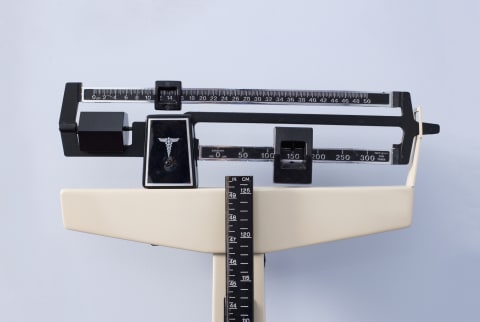Your 2023 Resolution Shouldn't Be To Lose Weight — Here's Why


According to a survey conducted by YouGov in 2019, 48% of the U.S. adults who made New Year's resolutions wanted to lose weight. And while I'm not going to sit here and act like maintaining a healthy weight isn't important, I am asking you to question what exactly initiated your desire to lose weight.
As someone raised in an era where models with extremely thin frames dominated magazine covers, billboards, and fashion runways (by a woman heavily influenced by the diet culture of the '80s and '90s, I might add), I have a bone to pick with the societal pressure to lose weight. Here's why:
Your weight & BMI mean nothing without context.
Body mass index (BMI) only considers height and weight to estimate an individual's weight and adiposity status1 (i.e., underweight, healthy, overweight, obesity). While this metric is certainly useful for population-wide research and in some clinical settings, it doesn't give an accurate depiction of a person's overall metabolic health and well-being.
BMI is also dismissive of sex, racial diversity, and body composition nuance. For example, a highly fit athlete with a muscular build may be categorized as "overweight" or "obese" due to their muscle mass. "The BMI standard was developed for an idealized Caucasian male, and the thresholds remain rather oblivious to important discrepancies warranted by gender and ethnicity," father of functional medicine Jeffrey Bland, Ph.D., previously shared with mindbodygreen.
When it comes to metabolic health (which should be the true goal when aiming to maintain a healthy weight), how much you weigh doesn't give a full picture. "Metabolism isn't just about weight. It actually has more to do with how our body uses the food we eat and converts it to fuel for energy, functional medicine nutritionist Brooke Scheller, DCN, CNS, previously explained to mindbodygreen.
Other aspects of your health—such as hormonal health, blood sugar levels, sex, muscle mass, gut health, medical conditions, and genetics—can play a massive role in how, where, and why your body holds on to fat. And many people who appear to be healthy may be struggling in other areas of metabolic well-being.
Alternative New Year's resolutions.
This year, consider focusing on a more impactful area of health rather than trying to fit into a certain jean size or reach your "dream weight." You are so much more than your weight and BMI!
Here are some possible New Year's resolutions to inspire your 2023 wellness journey:
- Work on loving yourself unconditionally
- Being more mindful of blood sugar balance
- Work with an endocrinologist to help balance your hormones
- Add more movement into your weekly routine
- Get deep, restful sleep on a regular basis
- Drink more water
- Eat more fruits and veggies
- Learn more about various metabolic health factors that influence your weight to better support your whole-body health
- Try a daily metabolism supplement to holistically support your metabolic well-being (see our guide to metabolism supplements here)
The takeaway.
If you've spent the past few years (or maybe even a lifetime) setting New Year's resolutions centered around your weight, maybe it's time to consider an alternative that comes from a place of compassion and self-love. Consider the factors that influence your metabolic health—such as physical activity, fueling your body with nourishing foods, holistic supplementation, and getting adequate sleep—to ensure you'll feel like your best self throughout 2023.

Morgan Chamberlain is a supplement editor at mindbodygreen. She graduated from Syracuse University with a Bachelor of Science degree in magazine journalism and a minor in nutrition. Chamberlain believes in taking small steps to improve your well-being—whether that means eating more plant-based foods, checking in with a therapist weekly, or spending quality time with your closest friends. When she isn’t typing away furiously at her keyboard, you can find her cooking in the kitchen, hanging outside, or doing a vinyasa flow.